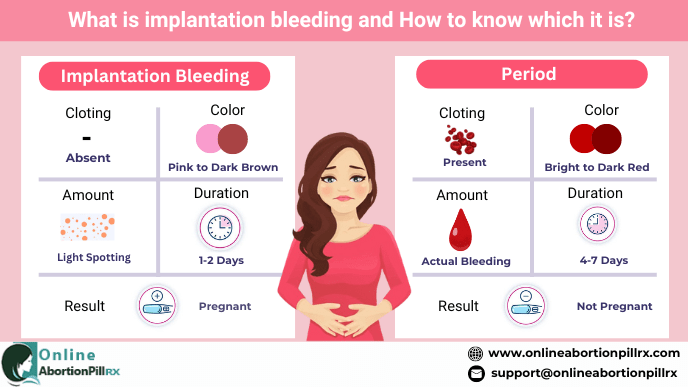What is Implantation Bleeding and Period Bleeding?
May 7, 2024 10:57 am Leave your thoughts
Have you ever encountered light spotting in the early stages of pregnancy but don’t know what it means? Well, implantation bleeding is something very common and can cause confusion and concern for many women. Understand what implantation bleeding is, the symptoms and signs when to see a physician.
What is implantation bleeding?
When a fertilized egg attaches itself to the uterus lining, it causes implantation bleeding. This is one of the early signs of pregnancy and occurs six to twelve days after conception. Unlike regular menstrual bleeding, implantation bleeding often lasts a shorter period and has a lighter flow. It could be light pink or dark brown. While bleeding when pregnant is an early sign of pregnancy, it’s a good idea to speak with your doctor to rule out any other possibilities.
Implantation bleeding occurs when the fertilized egg enters the uterine lining. During this process, some blood vessels are ruptured, which causes light bleeding. Not all women have implantation bleeding, and some don’t even notice it. However, for those who do, it can be an early sign of pregnancy.
Symptoms of implantation bleeding
Implantation bleeding can be identified by light spotting or first-trimester vaginal discharge that appears a few days before your upcoming cycle. This bleeding often happens with other symptoms that make it different from the usual period bleeding. Some common symptoms of implantation bleeding are:
Bleeding: Implantation bleeding is usually light and needs a panty liner or light pad. It is likely to contain an ordinary menstruation pad.
Colour: The colour of the blood can vary from bright pink to dark brown. It is typically less colourful and vibrant than menstrual blood.
Length: Unlike a regular period, implantation bleeding lasts only a few days. It usually lasts up to three days, though some women have only a few hours of spotting.
Clots: Implantation bleeding does not have clots. The blood is lighter and more watery.
Cramping: Some women can get cramps along with implantation bleeding. It can be similar to period cramps, but less severe than your regular periods.
How long does implantation bleeding last?
Implantation bleeding is different from woman to woman. Some women experience a few hours of light spotting, while others experience recurring bleeding over a few days.
However, implantation bleeding can be mistaken for an early period, due to the similar timing. If you’re uncertain whether the bleeding is from implantation or your menstrual cycle, track the course and flow of the bleeding. implantation bleeding is usually lighter and shorter than regular periods.
Implantation bleeding: An early sign of pregnancy?
Pregnancy can sometimes be discovered early through implantation bleeding, though this is not always the case. While many women experience bleeding during implantation, some might fail to notice it. Other reasons for light bleeding or spotting include hormonal fluctuations and vaginal infections.
If you believe you’re pregnant and are having light bleeding, you should take an at-home pregnancy test or speak with your doctor. These tests will confirm pregnancy and determine the cause of the bleeding.
How to know the difference between implantation bleeding and period
Differentiating between implantation bleeding and a regular period can be difficult because the symptoms can be similar. However, slight differences can help you identify between the two:
Tracking the period, flow, and colour of the bleeding might help you determine if it is implantation bleeding or period bleeding.
If you need more information about Implantation bleeding and Period bleeding
visit our Twitter account:- @onlinepillstore
How to manage implantation bleeding
While implantation bleeding normally requires no particular treatment, certain tips can help manage any discomfort or irritation that takes place:
- Use pantyliners: Since implantation bleeding is light, using light pads or panty liners can help manage it without unnecessary bulk or discomfort.
- Do not use tampons: Pantyliners should be avoided during implantation bleeding since they may carry bacteria and increase the risk of infection.
- Hydrate yourself: Drinking plenty of water can help maintain overall vaginal health and prevent any irritation or dryness that may cause discomfort during implantation bleeding.
- Take rest: Take good rest and avoid heavy exercise to help relieve any pain or cramps caused by implantation bleeding.
Each woman has a different experience with implantation bleeding and what is effective for one might not be effective for another. Always listen to your body and seek medical attention if you have any concerns.
Other reasons for vaginal bleeding
Implantation bleeding causes light bleeding during early pregnancy, but other reasons for vaginal bleeding should be taken into consideration.
- Miscarriage: Miscarriage can cause vaginal bleeding, it can cause severe cramping or abdominal pain. If you suspect a miscarriage, seek immediate medical attention.
- Ectopic pregnancy: In some cases, vaginal bleeding can indicate an ectopic pregnancy, when the fertilized egg is implanted outside the uterus, but to the fallopian tube. This is a serious condition that requires immediate medical attention.
- Hormonal changes, and infections: Vaginal infections or hormonal changes can also cause light bleeding or spotting. If you suspect an infection or have irregular bleeding, you must speak with your doctor.
If you don’t know the cause of your bleeding and feel any discomfort, seek medical attention for proper diagnosis and treatment.
Conclusion
Implantation bleeding is normal and it can cause confusion and worry for many women. While it is generally accepted as a normal aspect of early pregnancy, it is essential to be aware of the signs and symptoms to identify implantation bleeding. If you have any questions related to implantation bleeding, you can visit our website onlineabortionpillrx.com for accurate information and guidance. Understanding implantation bleeding allows you to manage the early stages of pregnancy with confidence and peace of mind.
Categorised in: Periods and Symptoms, Pregnancy, Women Health
This post was written by Marcella












